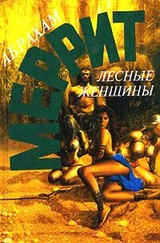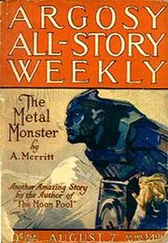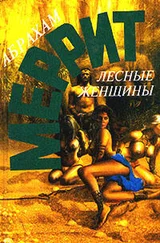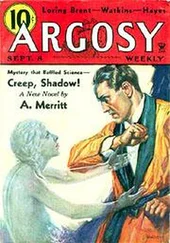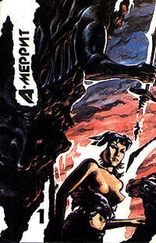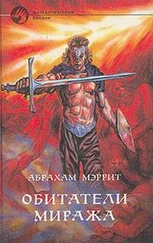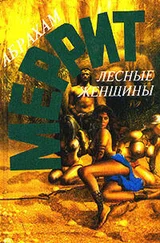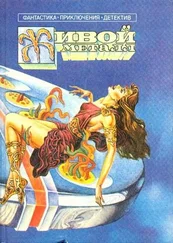Through many passages the captain and the black priest had hurried Kenton to this place. And now the king drank deep, set down his cup and clapped his hands.
"The King of Emakhtila judges!" intoned the Chinese, sonorously.
"He judges!" whispered the bowmen ranged along the walls.
Kenton, black priest and captain stepped forward until their breasts touched the foremost arrow points. The king leaned, merry eyes twinkling on Kenton.
"What jest is this, Klaneth?" he cried in a high, thin treble. "Or have the Houses of Bel and Nergal declared war upon each other?"
"They are not at war, lord," answered Klaneth. "This is the slave for whom I have offered great reward and whom I now claim since I have taken—"
"Since I have taken, Mighty One," interrupted the captain, kneeling as he spoke. "And so have earned Klaneth's reward, O Just One!"
"You lie, Klaneth!" chuckled the king. "If you are not at war why have you trussed up—"
"Look again, lord," interrupted Klaneth. "I do not lie."
The watery eyes peered closer at Kenton.
"No!" laughed the king. "You are right. He is what the other man would be were he half as much a man. Well well—"
He raised the flagon; before he had half lifted it to his lips he paused and looked into it.
"Half full!" giggled the king. "Only half full!"
He glanced from the flagon to the girl who stood closest to the kneeling girl at his left. His round face beamed on her.
"Insect!" chuckled the king. "You forgot to fill my flagon!"
He raised a finger.
A bow string sang along the left wall, an arrow shrilled. It struck the trembling girl in the shoulder on the right side. She swayed, eyes closed.
"Bad!" the king cried merrily, and again held up a finger.
From the frieze along the right wall another bow string sang; an arrow whittled across the room. The shaft cleft the heart of the first archer. Before his body touched the floor the same bow sang once more.
A second shaft leaped into sight deep within the left side of the wounded girl.
"Good!" laughed the king.
"Our lord has granted death!" chanted the Chinese. "Praise him!"
"Praise him!" echoed the bowmen and the cup maidens.
But Kenton, mad with swift rage at that heartless killing, leaped forward. Instantly the bow strings of the six and thirty archers before him were drawn taut, arrow shafts touched ears. Black priest and captain caught him, threw him down.
The Chinese drew a small hammer and struck the blade of his sword. It rang like a bell. Two slaves came out on the dais and carried the dead girl away. Another girl took her place. The slaves dragged off the dead archer. Another slipped through the curtains and stood where he had been.
"Let him up," crowed the king—and drained his filled flagon.
"Lord—he is my slave." All the black priest's will could not keep the arrogant impatience out of his voice. "He has been brought before you in obedience to your general command. You have seen him. Now I claim my right to take him to his place of punishment."
"Oh–ho!" the king set down his cup, beamed at Klaneth. "Oh–ho! Sh–so you won't let him up? And you will take him away? Oh–ho!
"Toe nail of a rotting flea!" he shrilled. "Am I King of Emakhtila or am I not? Answer me!"
From all around the chamber came the sigh of tight drawn bow strings. Every arrow of the silver and scarlet frieze of bowmen was pointed at the black priest's great body. The captain threw himself down beside Kenton.
"Gods!" muttered that shoulder. "Hell take you and the reward. Why did I ever see you!"
The black priest spoke, voice strangled between rage and fear—
"King of Emakhtila you are!"
He knelt. The king waved his hand. The bow strings dropped loose.
"Stand up!" cried the king. The three arose. The King of Emakhtila shook a finger at Kenton.
"Why were you so angered," he chuckled, "by my boon of death to those two? Man—how many times, think you, will you beseech death to come, and pray for my swift archers before Klaneth is done with you?"
"It was slaughter," said Kenton, eyes steady on the watery ones.
"My cup must be kept filled," answered the king gently. "The girl knew the penalty. She broke my law. She was slain. I am just."
"Our lord is just!" chanted the Chinese.
"He is just!" echoed the archers and the cup maidens.
"The bowman made her suffer when I meant painless death for her. Therefore he was slain," said the king. "I am merciful."
"Our lord is merciful!" chanted the Chinese. "He is merciful!" echoed the bowmen and the cup maidens.
"Death!" the king's face wrinkled jovially. "Why, man—death is the first of boons. It is the one thing out of which the gods cannot cheat us. It is the one thing that is stronger than the fickleness of the gods. It is the only thing that is man's own. Above the gods, heedless of the gods, stronger than the gods—since even gods in their due time must die!
"Ah!" sighed the king—and for a fleeting instant all King Cole jocundity was gone. "Ah! There was a poet in Chaldea when I dwelt there—a man who knew death and how to write of it. Maldronah, his name. None here knows him—"
And then softly:
"'Tis better be dead than alive, he said—But best is never to be!"
Kenton listened, interest in this strange personality banishing his anger. He too knew Maldronah of ancient Ur; had run across that very poem from which the king had quoted while going through some of the inscribed clay tablets recovered by Heilprecht in the sands of Nineveh—back in that old life, half forgotten. And involuntarily he spoke the beginning of the last macabresque stanza:
"Life is a game, he said; Its end we know not—nor care, And we yawn ere we come to its end—"
"What!" the king cried. "You know Maldronah! You—"
Old King Cole again, he shook with laughter. "Go on!" he ordered. Kenton felt the bulk of Klaneth beside him tremble with wrath. And Kenton laughed, too—meeting the twinkling eyes of the king; and while the Lord of the Two Deaths beat time with cup and flagon he finished Maldronah's verse, with its curious jigging lilt entangled in slow measure of marche funerale:
"Yet it pleases to play with the snare, To skirt the pit, and the peril dare, And lightly the gains to spend; There's a door that has opened, he said, A space where ye may tread— But the things ye have seen and the things ye have done, What are these things when the race is run—
And ye pause at the farthest door? As though they never had been, he said— Utterly passed as the pulse of the dead! Then tread on lightly with nothing to mourn! Shall he who had nothing fear for the score? Ah—better be dead than alive, he said— But best is ne'er to be born!"
Long sat the king in silence. At last he stirred, raised his flagon and beckoned one of the maidens.
"He drinks with me!" he said, pointing to Kenton.
The archers parted; let the cup maiden pass. She stood before Kenton; held the flagon to his lips. He drank deep; lifted head and bowed thanks.
"Klaneth," said the king, "no man who knows Maldronah of Ur is a slave."
"Lord," answered the black priest, stubbornly. "Yet this man is my slave."
The king again sat silent, drinking now from cup and now from flagon; eyes now on Kenton, now at Klaneth.
"Come here," he ordered at last—and pointed with one finger at Kenton, with another at the side of the Chinese.
"Lord!" said Klaneth, more uneasily yet as stubbornly. "My slave stays beside me."
"Does he?" laughed the king. "Ulcer on a gnat's belly! Does he?"
All around the chamber the bow strings sighed.
"Lord," panted Klaneth, with bowed head. "He goes to you."
As he passed him, Kenton heard the black priest's teeth grate; heard him sob as does a man after a long race. And Kenton, grinning, stepped through the opened space of archers; stood before the king.
Читать дальше
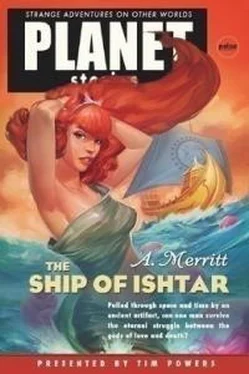
![Абрахам Меррит - Лунный бассейн [Лунная заводь]](/books/20623/abraham-merrit-lunnyj-bassejn-lunnaya-zavod-thumb.webp)
